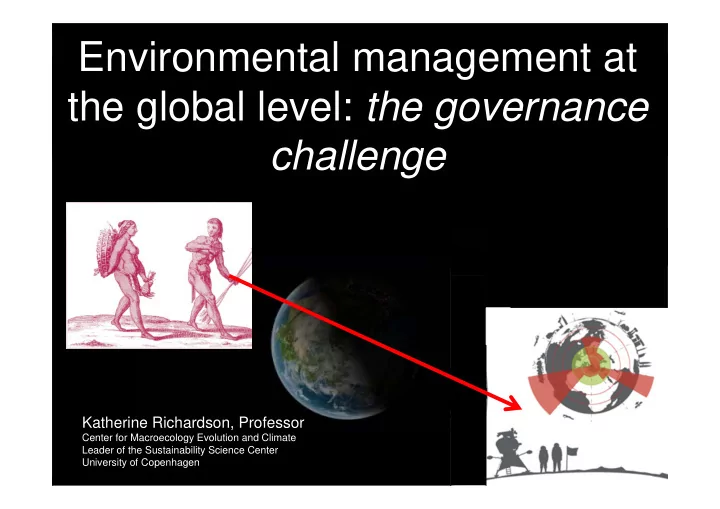

Environmental management at the global level: the governance challenge Katherine Richardson, Professor Center for Macroecology Evolution and Climate Leader of the Sustainability Science Center University of Copenhagen
Professor Katherine Richardson www.sustainability.ku.dk 2100? 2014
Professor Katherine Richardson www.sustainability.ku.dk Science CANNOT Science CAN : • Provide proof • Observe (enough Observationer can lead to fact) • (= we will never have 100% • ”Explain” (i.e. find the most certainty) likely explanation for the observations) What is the role of the UN Climate Panel IPCC here?
Professor Katherine Richardson www.sustainability.ku.dk IPCC = Intergovernmental Panel on Climate Change • Consists of 3 working groups • Does not make new observations (does not do research)! ”Assessment” – provides • a resume of all existing observations (reported in the scientific peer reviewed literature) • ”lowest common denominator”
Professor Katherine Richardson www.sustainability.ku.dk What do the observations show? • Much variability in air temperature but • That the last 3 decades are the warmest on record From IPCC AR5 WG1 Sept. 2013
Professor Katherine Richardson www.sustainability.ku.dk That warming is ”patchy” : From IPCC AR5 WG1 Sept. 2013
Professor Katherine Richardson www.sustainability.ku.dk That rainfall patterns have changed: From IPCC AR5 WG1 Sept. 2013
Professor Katherine Richardson www.sustainability.ku.dk AND that • Arctic sea ice is reduced • The ocean is warming • Sea level is rising • The ocean is being acidified
Ocean acidification Challenge to marine biodiversity and ability of oceans to function as sink of CO 2 The ”other” CO 2 problem! Turley et al 2006 • Southern Ocean and Arctic ocean projected to become corrosive to aragonite by 2030- 2060
Professor Katherine Richardson www.sustainability.ku.dk From R. Buddemeier, based on Kleypas et al. 1999 Figure 4.12 In Steffen et al 2004: Global Change and the Earth System, a planet under pressure. Springer
Professor Katherine Richardson www.sustainability.ku.dk How does the IPCC explain these observations? It is extremely likely that more than half of the observed increase in global average surface temperature from 1951 to 2010 was caused by the anthropogenic increase in greenhouse gas concentrations and other anthropogenic forcings together. The best estimate of the human ‐ induced contribution to warming is similar to the observed warming over this period ”> 95% certain that humans are causing global climate change”
Professor Katherine Richardson www.sustainability.ku.dk Charles Darwin: 1809 ‐ 1882 • On the Origin of Species (1859) Challenged the contemporary (religious based) understanding of the Human ‐ Earth Relationship and the contemporary economic paradigm. • Over 150 years later, potential US Presidential candidates are discussing whether Darwin’s conclusions should be taught in schools!
Professor Katherine Richardson www.sustainability.ku.dk The changing human enterprise, from 1750 to 2000 Note the start of the ’ Great Acceleration ’ around 1950, when many activities began or accelerated sharply Steffen et al. 2004 Steffen et al 2004
Professor Katherine Richardson www.sustainability.ku.dk Responses of the Earth System to the accelerating human enterprise. Root cause = demand for resources and services approaching supply! Steffen et al 2004 ”Business as usual is dead!” Lord Nicholas Stern, 2009 Steffen et al. 2004
Planetary Boundaries: Exploring the safe operating space for humanity in the Anthropocene ( Nature , 461 : 472 – 475, Sept 24 - 2009)
Enhedens navn ? Latest data ? ? 90-00 Nitrogen acidity Ocean ? flow 70-80 ? 50-60 Pre- Ind. Sted og dato Dias 16
Professor Katherine Richardson www.sustainability.ku.dk For the first time in human history, the demand for some essential natural resources and services is beginning to exceed supply • ”Environment” can no longer be regarded as being distinct from societies (economic) interests (natural resources = currency) • Future human development can only be based on more efficient resource use and/or the development of alternatives for resources where supply cannot meet demand.
Professor Katherine Richardson www.sustainability.ku.dk The greatest challenge of the 21 st century: Acknowledging that the planet’s resources are limited AND the development of (governance) mechanisms to share these resources among 9 billion people 18
Recommend
More recommend